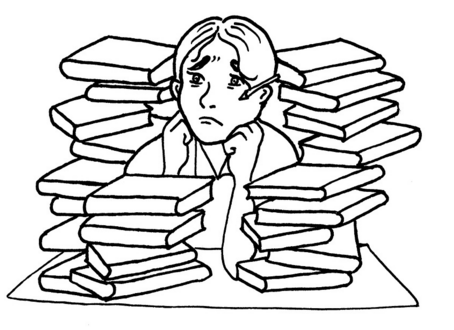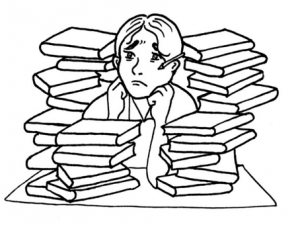By Katherine Han
Imagine this: You get out of school around 3:00 pm, and you’re probably pretty tired from the 7 hours of instruction. After school, you still have one or two activities to attend. Say you get home around 6:30 pm. You take a shower, eat dinner with your family, and it’s likely already close to 8:00pm. So you head upstairs to your room to do your homework. Each of your classes has assigned around 45 minutes of homework. When you put all of the homework together, you realize that you have an entire load of work to complete for tomorrow. By the time you finish your homework, it is 11:30pm, and your parents are already asleep. That is what a day in my life generally looks like. Therefore I think that schools should reduce the amount of homework assigned to students because excess homework causes stress, sleep deprivation and fatigue, and less time spent with family and friends.
One reason that schools should reduce the homework load is because an excess load can cause students to have a lot of stress. Even though schools are being more careful now with assigning only a certain amount of homework per class, when you put all of the classes together, you end up with a long list of homework items. This can cause students to feel very pressured because they want to finish all their homework on time. Students are always rushing to finish their homework due to the amount they have and all of the other activities they have going on in their lives. I have seen one of my fellow classmates cry because he was so overwhelmed by the amount of homework he had to complete. Students also tend to stress over homework because they know that their homework grade affects their overall grade in the class. Homework should be a review of the new material learned in class, but instead, it’s just causing a lot of stress in students.
Homework is also one of the main reasons students are often sleep deprived and tired. A lot of students get home late due to after school activities. Coming home late and then having to complete a load of homework causes the students to go to bed even later. I have volleyball practice from 3:00 to 5:00pm. On game days, I don’t get home till around 7:00 pm. Because of this and all of the homework that I have, I’ve been going to bed at nearly midnight every night. I go to school the next day feeling sleep deprived and weak. I often end up becoming inattentive during class due to the lack of sleep I received the night before. An elementary school in Massachusetts recently started a no-homework pilot program. The principal of the school says, “We want them [the kids] to go to soccer practice or football practice, and we want them to go to bed. And that’s it” (Reilly). Having less or no homework could definitely increase the number of hours of sleep each student gets every night. The purpose of this program in Massachusetts is working towards that goal. It’s a common belief that homework is a great way to cement new material into student’s minds. However, “research has been unable to prove that homework improves student performance” (“Elementary School Bans Homework”). Other studies have shown that “homework can cause physical and emotional fatigue, fuel negative attitudes about learning and limit leisure time for children” (Reilly).
Another reason schools should assign less homework is because homework can be the cause of less time spent with family and friends. I often spend more time in my room doing homework than with my family. I sometimes even have to miss out on social events with friends because I know that I have a lot of homework left to complete. I’ve also seen some of my friends turn down events or get-togethers because they have a load of homework to complete. If schools assigned less homework, students would be able to complete the homework quicker, and they would be able to spend more time with their family and friends.
Some people say that homework is a great way to get extra practice and to help students learn new material. In some ways, this is true. Homework does provide extra practice for students, and there’s many assignments that teachers have assigned that have proved to be very helpful. However, assigning loads of homework doesn’t help anyone. Instead of overloading students with homework, schools can find an alternative way to get in some “extra practice” for the students who need or want it. For example, adding on time to the school day to allow teachers more time for instruction could fill in for the extra practice that homework provides. Another option is finding a healthy medium. Schools could work to find just the right amount of homework that each class should assign. Most importantly, this limit should be enforced throughout the school to ensure no student ends up with a load of homework regardless of the limit.
There has always been a large debate around homework. In ways, homework can help, but it has also caused lots of negative effects as well. Schools should assign less homework to students because it causes stress, sleep deprivation and fatigue, and less time spent with family and friends. If schools could work to find a better alternative to assigning a load of homework, it could take a large burden off of the student’s shoulders that could prove to seriously improve the student’s lives.
 Tempus Magazine By Students, For Students
Tempus Magazine By Students, For Students 




